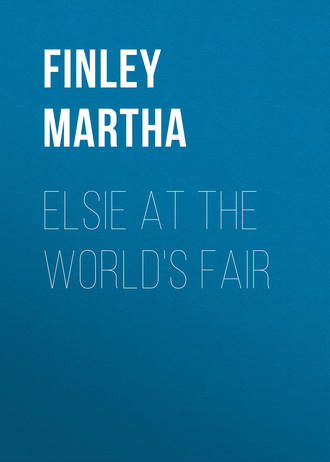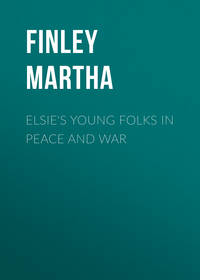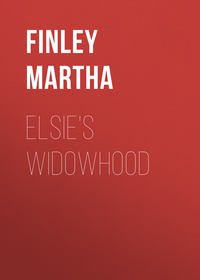 полная версия
полная версияElsie at the World's Fair
Violet was on her husband's other side, and Dr. Conly and his Marian near at hand on the farther side of Grace.
"You are looking weary, little cousin," he remarked, giving her a searching look; "so weary that were I asked for a prescription it should be an early retirement to your berth, to be followed by a long night's rest. However, I suppose you are Harold's patient now."
"Yours too, Cousin Arthur," she said with a smile; "also papa's, and he has already given me the very same prescription."
"As I do, if I am consulted," said Harold, "and when three such physicians agree, you surely will not venture to disregard their advice."
"No, indeed!" she returned, with her own sweet smile again, "nor would I, if any of the three had given it. I do really feel the need of rest for to-night, but hope you will all agree to let me go at least as far as the Court of Honor to-morrow."
"That will depend upon how you are feeling in the morning," returned her father, Violet adding: "And if you should have to stay here and rest for a day or two you need not feel so very badly about it, Gracie, because our time for remaining in and about the White City is not limited like that of some less fortunate people."
"No, mamma, and that is something to be thankful for. Oh, I do think myself a most fortunate girl," Grace said in reply, directing a look of ardent affection toward her father as she spoke. The other young folks were chatting together near by, principally of the beauties of the Fair, and indulging in many a merry jest and much light laughter.
"The Court of Honor is, in my opinion, the most beautiful place in the world," remarked Rosie; "at least the most beautiful I have ever seen or can imagine; especially at night, when the magnificent MacMonnie's fountain, and the electric fountains are all at play. What beautiful rainbow-colored showers they send up! I never dreamed of anything so lovely and can never weary of looking at them."
"Nor have I," said Croly. "I move that we all go over there presently; in time to witness the lighting up."
There was a general assent, and young Percy Landreth, who had managed to secure a seat close at Lucilla's side, said to her in an undertone: "You will go surely, and may I have the pleasure of acting as your escort?"
"I don't know," she returned with a slight laugh and an arch look at Chester Dinsmore, who, sitting near on her other side, had overheard the request, and was looking slightly vexed and disappointed; "papa hasn't told me yet whether I may go to-night or not; and I'm 'a young thing who cannot leave her father' or go anywhere without his knowledge and consent. I'll ask him, however," she concluded, jumping up and hastening to the captain's side. "Papa," she asked, "can I go presently to the Court of Honor with the others – and you? for I suppose you are going?"
"I think it likely that your mamma and I will be going after a little," he said in reply; "but Grace is too weary to return there to-night, and you too would be the better able to enjoy yourself at the Fair to-morrow should you go early to bed to-night; so that is what I wish you to do."
"Indeed, papa, I am not so very tired," she said half imploringly, half in vexation. "Mayn't I go?"
"You have my answer to that question, daughter," he replied in a tone so low that the words scarce reached any ear but hers. "I think it best for both you and Grace that you should stay here with her, and surely you love your sister well enough to do so willingly, even if you had your father's consent to your going ashore for the evening?"
"Papa," said Grace, overhearing the last sentence, "I would not have Lu miss the pleasant evening on shore on my account. I will go directly to bed and probably fall asleep at once."
"As I hope and believe Lucilla will also," he returned, with a glance of grieved displeasure bestowed upon his eldest daughter, which sent a remorseful pang to her heart.
"Oh, father, don't be vexed with me," she entreated low and tremulously, putting a hand into his as she spoke; "I am glad that I am under your orders; I am, indeed, and would not for anything leave dear Gracie alone."
"I am sure of it, daughter," he returned, pressing the hand affectionately as he spoke. "Also I think that to-morrow you will be thankful to me that you have had a rest from exertion and excitement."
"Yes, papa, I always find that your way is best, and I am very glad and thankful that I have such a kind, wise father."
"Well, Lu, did you get leave to go?" asked Rosie as Lucilla rejoined the circle of young people. "No; papa wishes me to stay here and get to bed early that I may be well rested for to-morrow's exertion in seeing the sights of the White City," Lucilla answered in a lively, cheerful tone, that seemed to indicate entire satisfaction with her father's decision. She was in fact so remorseful over her momentary exhibition of wilfulness that she felt as if she no longer cared for anything but to convince her dearly loved father of her penitence on account of it, and her desire to do exactly as he directed.
"A wise and kind decision, Lu," remarked Herbert Travilla, overhearing what she said. "A rest now may save you from a serious break-down some days or weeks hence."
"Yes, Uncle Herbert, I am well aware that such a father as mine is a very great blessing," she returned with a smile. "I only wish I were as good a daughter."
Just at that moment the guns announced the setting of the sun, and the flags on the Dolphin and other vessels came down with the usual ceremonies. That over, those who intended going ashore for the evening or the night began their preparations, which were such as to occupy but a few minutes. Violet put her little ones to bed, and the captain, who had carried sleepy little Ned down to the state-room, on coming out into the saloon found Lucilla there waiting to speak to him.
"Papa," she said humbly, "have you quite forgiven my crossness to-night when you refused to let me go ashore? I am very, very sorry for it, but I am perfectly satisfied now with your decision; I was, the next minute, and oh, I do love you dearly, dearly, though I can hardly expect you to believe it when – when I'm so ready to be rebellious," she added, hiding her face on his breast, for he had taken her into his arms the moment she began to speak.
"Yet I do believe it, my own darling," he replied in tender tones, smoothing her hair caressingly as he spoke. "I fully believe that you love me devotedly, though for a moment you indulged in the old rebellious spirit that used to cause so much pain to both you and me. However, this is almost the first time I have seen any show of it for two or three years. In all that time you have been as willingly and cheerfully obedient as anyone could ask or expect a daughter to be."
"Oh, thank you, my dear father, for saying that!" she responded, lifting to his, eyes beaming with happiness, "and I do intend that it shall be my very last failure to be as promptly and cheerfully obedient as possible, for I know you never deny me anything, unless you see that it is for my good, and I have never known you to make a mistake about that. Do you want Grace and me to go to bed as soon as you and the others are gone?"
"I think it would be well for you to do so, but if you both prefer it you may stay on deck for another half hour."
"Then I will get ready for bed at once, papa, for I want to do exactly as you think best, and I know Gracie does also."
"Yes, I know she does; and, by the way, I must carry her down before I go; she is so weary, poor child," he said, hurrying up to the deck.
Lucilla waited only to see the others off, then joined her sister in their state-room.
"You poor dear, you are so tired!" she exclaimed, noticing Grace's weary expression and heavy eyes. "You must let me help you with your preparations for bed."
"Thank you, Lu," returned Grace; "you are such a dear sister – always so kind and helpful to me; but I am sorry that for my sake you should lose the pleasure of going to the Court of Honor with the others to-night."
"O Gracie, you know we always find out in the end that papa's way is the best for us both, and he refused my request for my own sake as well as yours."
"Yes; he is the very kindest and best of fathers," said Grace; "he never refuses any one of his children anything he can give them when he thinks it good for them."
"But now I must stop talking and go to sleep as quickly as possible, as he bade me when he brought me down here."
Both she and Lucilla were asleep in a few minutes and awoke the next morning feeling greatly refreshed and rested.
"Shall we visit the Turkish village to-day?" asked Violet at the breakfast table.
"I say aye to that," said Walter. "I want to see it and make some purchases there. I've heard that there is a street there with booths along on the side and a bazaar where one can buy various kinds of Turkish goods. I want to get some if only for curiosities."
"And for a quarter you can go up in the restaurant and see the girls dance," said his sister Rosie; "or into the theatre to look at a representation of Mohammedan home life and adventure. So Mr. Will Croly told me."
"Well, I don't know about going to the theatre," returned Walter, "but I'd like to see their mosque with its minaret, at noon or sunset, when a real muezzin comes out and calls upon the faithful to remember Allah and give him glory."
"He does it at sunrise too, doesn't he?" asked Evelyn Leland.
"Yes; but we'll never get over there in time for that. Some of our American folks don't know what he is about, – not understanding his language – and imagine that he's selling popcorn or advertising the dance-house, or maybe calling for somebody to come and help him down."
"How, Uncle Wal?" asked Neddie.
"With a ladder, I suppose."
"Do they bring it to him?"
"I don't think they have yet, Neddie; at least I haven't heard of it. But wouldn't you like to go and see it all?"
"Yes; if papa will take me; and mamma will go too."
"How many would like to go?" asked the captain, and everyone responding in favor of so doing the question was considered settled.
They set out at their usual early hour, met Harold and Herbert in the Peristyle, lingered a little in the Court of Honor, then made their way to the Turkish village, went through the booths and bazaar, making a number of purchases, looked at the mosque and heard the noon cry of the muezzin.
Then they visited an Arabian tent and the fac-simile of a house in Damascus. In the tent there were male and female Arabs sitting cross-legged; some of them boiling coffee, or making thin wafer cakes, while others played on odd looking instruments and chanted in monotonous tones.
The party went into the house, found that it contained but one room, oblong in shape, with high ceiling, and windows just beneath the cornice.
"That would hardly do for Americans," remarked Walter, gazing up at them, "for we could not see into the street."
"We could go to the door, Uncle Walter," said Elsie.
"Or have a step-ladder to carry about from one window to another," laughed Rosie.
"I like the festooned walls, the fountain in the centre, and the thick rugs on the floors," remarked Violet; "the hanging lamps too, and ornaments of rich woods inlaid with ivory; also the divans that look like such comfortable resting-places."
"Yes, madame would find them pleasant to rest upon," responded a young Turk in excellent, but quaintly intoned, English; then he went on to explain everything in the same tongue.
Their next visit was to Cairo Street, at the gate of which ten cents was asked for the admission of each one of the party; a small sum they thought, to give in payment for a sight of all that was on exhibition inside. Having passed through the gate they found themselves in a street square, with a cafe opening into it on one side. Entering it they sat down and looked about them.
Captain Raymond, who had been more than once in Cairo itself, pronounced the scene an exact copy of what was to be found there, and they presently learned that the doors and wooden-grated windows had been brought bodily from that city.
They could see projecting balconies, mysterious archways, airy loggias, and tiny shops filled to overflowing with such things as many a one would want to buy, and being in easy circumstances they bought a number of articles such as were not too heavy or cumbersome to be easily carried.
Soon, however, their attention was turned to the crowds in the streets. Near by was a donkey and camel stand – donkeys standing and camels lying down in their own peculiar fashion.
"Oh, what funny fellows!" laughed little Ned.
"Yes," said his father, "those are camels. Would you like to take a ride on one?"
"No, sir; I might fall off."
"Yes, Ned, and hurt yourself; maybe break your leg; and it would take even Cousin Arthur a good while to mend it; so that you would miss the pleasure of going about with the rest of us," said Walter.
"I don't want to ride just now," said Ned, "but if I did I'd rather try one of those little horses."
"Donkeys, Ned," corrected his sister Lucilla, "and what little fellows they are! no bigger than Max's dog Prince!"
"Oh, see!" cried Rosie with a merry laugh, "that one going down the street knocked against that big fat man and almost upset him."
"Notice the drivers," said Evelyn, "all so swarthy and with such black eyes, naked feet, long caftans, fez, and turbans. And what a keen watch they keep for customers. Evidently they do not despise American dollars, dimes, or cents."
"No, indeed! not they," said Walter. "Oh, there are a couple who evidently contemplate taking a ride on a camel; see, the young fellow seems to be bargaining with one of the drivers; and how the people are crowding round to look and listen!"
"What's the price?" they heard the young man ask. They did not catch the reply, but he went on with his questions: "Will he bite? Is he quite tame? Is there any danger at all?"
"No-a bite," returned the driver; "good camel," and as he spoke he reached for the girl, who shrank back a little. But he quickly lifted her to the saddle and showed her how to hold on.
Then the young man climbed up behind her, reached around her waist and seized the hand-hold as if determined that nothing should tear it from his grasp.
The girl noticed it and grew more frightened, turning a trifle paler and asking: "Is there any danger?"
But the driver was already tugging at the halter and striking the camel over the neck with his stick, and slowly it spread out its hind legs, rising on them first, and throwing its riders forward till it seemed as if they must slide down his sloping neck and fall to the ground.
The girl screamed, as her hat fell over her eyes, but both she and her escort held on with a deathlike grip.
The camel paused for a moment, then swayed back and forth sideways; the girl screamed again, but the camel was only untangling his legs, and the next instant settled himself on them in a way that threw his riders backward so that they would have fallen off behind but for their firm grasp of the ropes.
But now the camel was fairly upon his four feet, and slowly turning round with a wobbling motion like a boat caught in a trough of waves; the riders had recovered from their fright, and were both laughing. All this time the crowd had been standing round watching the two, and laughing and tittering, for, risky as the whole proceeding looked, there was really very little, if any, danger.
CHAPTER XIII
"Let us go now to the Guatemala Building," said Harold as they left Cairo Street. "I should like you all to see the grotto with its specimens of the fauna of the country, among which is a remarkable bird called the gavila, which sings the half-hours with unvarying regularity, showing itself as correct as a sundial, and almost as useful as a government observatory."
"Is it sure to wake and sing every half-hour in the night, uncle?" asked little Elsie.
"Oh, no! It is only a day clock; stops attending to the business at sundown and begins again in the morning."
They were interested in the strange bird; the older people in a map also, showing the locations of the principal towns and railways, and in the exhibit, in an open court and about a fountain, of the flora of the country; also some pictures hung about the balcony, showing the principal places in the city of Guatemala and other large towns.
"I feel a particular interest in Korea just at present," remarked Grandma Elsie as they left the Guatemalan Building, "and if entirely agreeable to the rest of you, I should like, now, to look at their exhibit in the Manufacturers' Building."
"Yes, mother; it is in the southwestern part," returned Harold, leading the way. "The booth is small, but crowded with exhibits. The Korean Royal Commissioner – with the singular name of Jeung Kiung Wow – has charge of it.
"That is a funny name, uncle," laughed Ned.
"And yet our names may have just as funny a sound to him," Violet said, smiling down at her little son.
When they reached the Korean booth the first thing that attracted their attention was the flag hanging from it. The captain was able to explain its design, and did so, the others listening with interest.
"It represents the male and female elements of nature," he said. "You see it is blue and yellow: the blue represents the heavenly, or male element, the yellow the earthly, or female. You see the heavens across the eastern sea and they seem to lap over and embrace the earth, while the earth to landward rises in lofty mountains and folds the heavens in its embrace, so making a harmonious whole. The four characters around the central figure represent the four points of the compass."
They passed in and found a good many sights which interested them – banners and lanterns, and bronze table and dinner set for one person, a cupboard with dishes, a fire pot and tools, boots and shoes of leather, wood, and straw; a kite and reel, a board on which is played a game resembling chess, white and blue vases, and a very old brass cannon used in the American attack on Korean forts in the seventies. Also there were banners hanging on the walls of the booth, and here and there stood screens, one of which was hand-embroidered by the ladies of the palace.
On dummies in the centre of the room were shown ancient warriors' costumes, the court dress of both a military and a civil official, and a lady's dress for the dance. And in an upright glass case were shown an embroidered silk cushion, various dress fabrics, a lady's dress and a lady's court dress and various articles of footgear.
There was a map showing Korea and adjacent countries, and attached to it was a paper headed, "Questions Answered."
Mr. Dinsmore stood before it and read of them aloud:
"Korea and Corea are both correct, but the former is preferred.
"Korea is not a part of China, but is independent.
"The Koreans do not speak the Chinese language, and their language resembles neither the Chinese nor the Japanese.
"Korea made treaties in 1882.
"All the articles are owned by the government.
"Korea has electric lights, steamships, telegraph, but no railroads.
"Koreans live in comfortable houses, heated by flues under the floor.
"Korean civilization is ancient and high; area one hundred thousand square miles; population sixteen million; climate like that of Chicago, country mountainous, mineral wealth undeveloped, agricultural products chiefly rice, beans, wheat, and corn."
"I am glad we came," remarked Rosie as they passed out of the booth, "for I know a good deal more about Korea than I did before, and find it a far more interesting country than I had any idea that it was."
The next visit was to the rotunda of the Government Building, where they found many mural paintings of famous incidents in American history and scenes in our largest cities, so that it was a good representation of our whole country.
In the rotunda was a hollow section of one of the largest trees that grow in the Maraposa grove of red woods in California. The interior was brilliantly lighted by means of incandescent lights, and a platform at the top of the trunk was reached by an inside, winding stairway. The chamber walls were covered with photographs showing the grove from which the tree trunk was cut, and how it was conveyed to the Fair and set up.
There were besides eight alcoves in the rotunda, in which were many articles, Colonial relics – such as the pipe which Miles Standish smoked, the first Bible brought to this country, in 1620, the year of the landing of the Pilgrims – a piece of the torch Putnam used when he entered the wolf's cave, the fife of Benedict Arnold, and many another scarcely less interesting.
"I think my two elder daughters have borne well the exertions of the day," the captain remarked, with a smiling glance at them, as again they stood upon the deck of the Dolphin.
"Yes, father; thanks to your kind thoughtfulness in sending us so early to bed last night," returned Lucilla, with a grateful, loving look up into his face. "The longer I live the more thoroughly convinced I am that you always know what is best for me."
"That is just my experience, Lu," laughed Violet, standing near, "and I'll venture to assert that Grace can say the same."
"Indeed I can!" responded Grace heartily, "and it is a great satisfaction to have one so wise, kind, and good almost always at hand to decide doubtful questions for you."
"Tut! tut! I wonder if any other man was ever tried with so much gross flattery," exclaimed the captain in feigned displeasure.
But at that moment others stepped upon the deck and their presence put an end to the bit of familiar family chat, Violet and her husband hastening to welcome their guests; for among the arrivals were Annis and several others from Pleasant Plains, whom they had not seen for some days – it being an easy matter for friends to miss each other among the crowds and the various buildings at the Fair; also Chester and Frank Dinsmore and Mr. Hugh Milburn, who had not been seen there before.
"Why, how do you do, cousin? I did not know you had arrived in the city," said Violet, offering her hand.
"Very well, thank you. I arrived only last night," he said, "and was not able to hunt you up till now. Ah, father, Cousin Elsie, captain," – shaking hands with each in turn – "it does one good to see all your kind, pleasant faces."
"And us to see yours," returned Violet. "But where are Ella and the boy?"
"At home," he answered; "at least that's where I left them."
"But why didn't you bring them along?" asked his father; "the bit laddie is not likely to have another chance to look at such sights as one may see here to-day."
"His mother thought him rather young for that, seeing he is not very far along in his second year," replied Hugh, "nor could she be persuaded to leave him behind. He is a person of consequence in his mother's eyes, is my little Ronald, if in no other."
"Ah, I can understand that," laughed Violet. "But now, Cousin Hugh, you must let me have the pleasure of introducing you to the cousins from Pleasant Plains."
It was quite a gathering of relatives and friends, all weary enough with the day's exertions in sight-seeing to enjoy resting in comfortable chairs on the vessel's deck, while comparing notes as to their experiences since coming to the Fair; what each had seen and heard, what they were planning yet to see, some caring more especially for one class of curiosities, some for another.
But hardly a half hour had passed when they were summoned to an excellent repast, after which they again repaired to the deck, where they gathered in groups and indulged in further chat.
Grace was a little apart from the others, reclining in a steamer chair.
"Are you very, very tired, Gracie?" asked Walter, coming to her side.
"Pretty tired," she answered, smiling up into his face. "Why? did you want me to do anything?"
"Oh, no! no, indeed! but I was just thinking that now that we have two ventriloquists here, we might have some fun – for so far as I know the folks from Pleasant Plains don't know anything about the extraordinary powers of Cousins Ronald and Hugh – and I hoped you weren't too tired to enjoy it."
"I don't believe I am," she laughed; "and I think I shall enjoy it if papa doesn't send me to bed too soon. It was very good in you to think of me, Walter."









